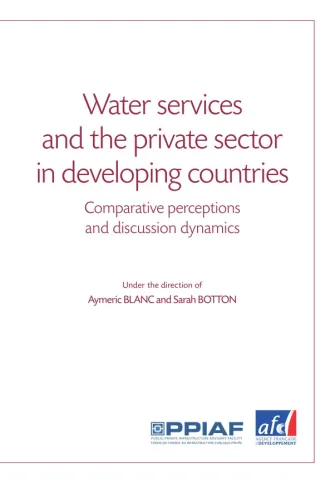Share the page
Water services and the private sector in developing countries. Comparative perceptions and discussion dynamics
Published on

During the past twenty years, participation of the private sector in the field of essential services has been a topic of much discussion, allowing the expression of very different viewpoints and the multiplication of disciplinary approaches around this question. However, little work has been done on the continuum formed by the search for equilibrium between public services and the private sector, from the origin of the development of services to the latest strategic shifts occurring in such services. In fact, the debate has exceedingly focused on the reform period of structural adjustments and on the great delegating contracts of the years 1990-2000, leaving little space for cross-cutting analyses covering different periods.This situation contributed not only to polarizing an ideological pro-/anti-privatization debate that was extremely harmful to the quality of sector-based reflections, but also to “searching for an optimal model " that accelerated when the “great illusion " (Stiglitz, 2003) gradually became apparent. In both cases, these dynamics led to losing sight of the true stakes to be decoded for embracing the sector-based reality as well as possible.
On the occasion of completing five years of research by AFD teams into public-private partnerships (PPP), we considered it useful to compare the analyses bearing on various periods and geographic areas, and made by different players in this field. This made it possible to try and construct the gateways needed for understanding the complex phenomena that compose the organization of essential drinking water services in developing countries. We were also fortunate to benefit from support from PPIAF for the translation of this publication, which allowed us to build an additional bridge between French- and English-speaking sector stakeholders. Fully aware of the pitfalls of the ideological debate, and attentive to the changes in this sector made by its social and political actors, we propose here a collective work that straddles the border between academic research and strategic reflections. As Schneier-Madanes (2010) noted, “the research scientist working on water has a ‘hybrid' status between ‘intellectual' and ‘expert'".
Useful Information
-
Authors
-
Aymeric BLANC, Sarah BOTTON
-
Edition
-
2
-
Number of pages
-
460
-
ISSN
-
2271-7404
-
Collection
-
Research
-
Other languages
